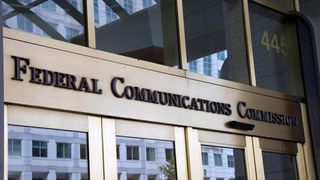FCC Input Could Aid DOJ Appeal of AT&T-TW Court Call

The FCC has filed a document with the U.S. Court of Appeals for the District of Columbia that could help the Trump Administration's challenge of a D.C. district judge's decision to allow the merger of AT&T-Time Warner, which closed back in June.
Related: DOJ Maps Out Plan for AT&T-Time Warner Appeal
That includes the current, Republican-led FCC emphasizing the previous Democratic-led FCC's conclusion that the Comcast-NBCU transaction would increase bargaining leverage and raise prices of programming to rival distributors—hence the conditions applied on that deal.
U.S. District Court Judge Richard Leon ruled June 12 that the government had failed to prove its case that the merger would not be in the public interest.
While the FCC's legal team, led by general counsel Tom Johnson, said it was not filing in support of any side, instead simply clarifying the lower court's apparent misconstrual of the commission's adjudicatory proceedings, its friend of the court (amicus) brief would be friendlier to the Trump side since it could buttress the Administration's appeal of that district judge's decision.
The FCC told the appeals court it wanted to clarify that the judge should have given weight to comments AT&T and DirecTV had filed in previous mergers, including the Comcast-NBCU merger, arguing that, in those vertical mergers—like AT&T-Time Warner—the result could be higher fees. The district court held those documents to be of limited value because AT&T and Time Warner had reason to argue against allowing a competitor to get bigger, and thus argue for the increased bargaining leverage theory those companies said did not apply to their merger.
"[B]ecause AT&T and DirecTV acted as competitors to (or customers of) distributors whose competitive positions would be affected by FCC review,'" FCC said quoting the district court, "the court was, '[f]or that reason alone...hesitant to assign any significant evidentiary value to [AT&T’s and DirecTV’s] prior regulatory filings.'”
Broadcasting & Cable Newsletter
The smarter way to stay on top of broadcasting and cable industry. Sign up below
The FCC said that such hesitancy was misplaced because the FCC rules require that no one subject to its rules, which would include AT&T and DirecTV as commenters on other mergers, provide incorrect information. That duty to be truthful, said the FCC, means the companies' arguments about the increased bargaining leverage should not be given lesser probative value.
"AT&T and DirecTV were subject to this obligation when they submitted comments in earlier FCC merger proceedings. Thus, there was no reason for the district court to treat those comments as less credible simply because AT&T and DirecTV were “competitors” of the merger applicants in those proceedings (rather than the applicants themselves)," the FCC told the court.
The district court also said that government citations of filings by AT&T and DirecTV with concerns about the Comcast-NBCU merger were of lesser value because the FCC's public interest standard was different from the antitrust standard Justice used to conclude the AT&T-TW merger was anticompetitive as structured (the FCC did not get to review that merger since it was structured so as not to involve the transfer of any licenses).
The FCC told the appeals court that while the public interest review was broader, it included competition analysis as one component, including looking to Justice's merger guidelines.
"In doing so, the FCC found, among other things, that 'vertical integration of NBCU’s programming and Comcast distribution assets would improve the bargaining position of the integrated firm when negotiating the sale of programming to one of Comcast’s video distribution rivals because some of the rival’s subscribers will shift to Comcast,'" the FCC said. "The integrated firm would thus be able 'to extract higher prices' from rival video programming distributors 'than pre-transaction NBCU was able to' negotiate."
Contributing editor John Eggerton has been an editor and/or writer on media regulation, legislation and policy for over four decades, including covering the FCC, FTC, Congress, the major media trade associations, and the federal courts. In addition to Multichannel News and Broadcasting + Cable, his work has appeared in Radio World, TV Technology, TV Fax, This Week in Consumer Electronics, Variety and the Encyclopedia Britannica.

